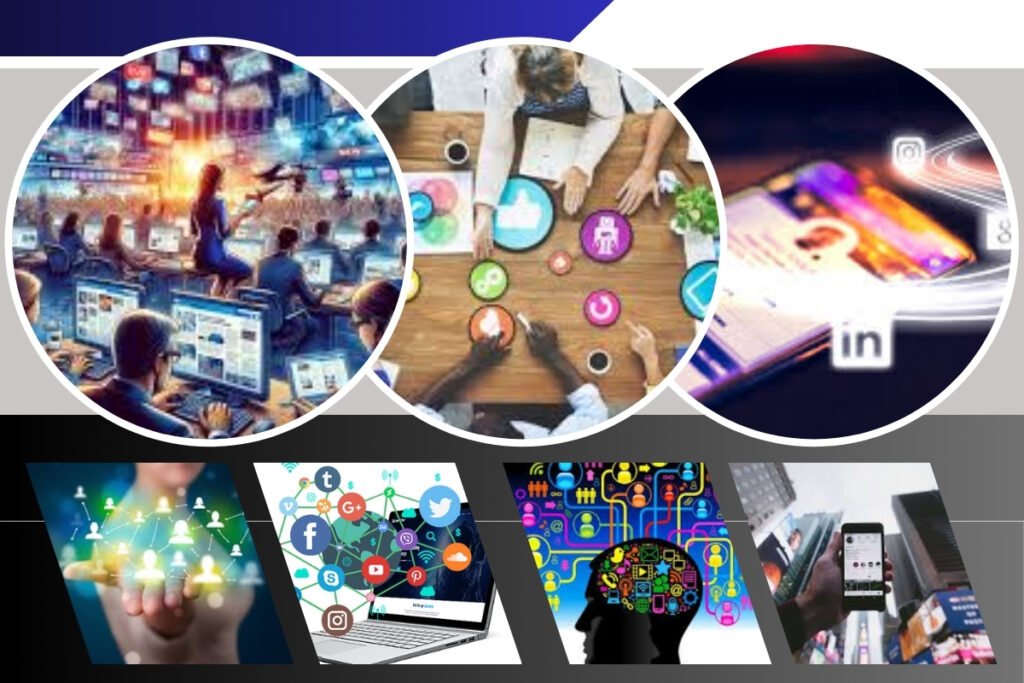Table of Contents
Toggle
INTRODUCTION:
Social Media has become a powerful tool in today’s world, shaping how we communicate and interact. It allows people to connect instantly, share ideas, and access information quickly. This rapid communication has led to significant social changes, affecting various aspects of our lives, especially for young people.
With the widespread use of social media, technology has brought both time-saving benefits and new challenges. Young people, in particular, are heavily influenced by social media, which impacts their academic performance and behavior. While social media can be a source of positive interactions and learning opportunities, it also raises concerns about addiction and psychological problems.
The influence of social media on youth behavior is profound. It can lead to both positive and negative changes in how they interact with the world. While some use it for positive social change and personal growth, others may face issues such as cyberbullying, anxiety, and distraction from their studies. Understanding these problems and finding ways to address them is crucial for fostering a healthy and balanced use of social media.
Do you want to know in detail about this?
The Rise of Social Media:
Social Media is a modern technology that allows people to share information and ideas online. Services such as Facebook, Twitter, and Instagram have become essential components of our everyday routines. These tools help people connect, communicate, and share their experiences easily.
Time-Saving Benefits:
One of the main advantages of social media is that it saves time. With just a few clicks, users can get news updates, stay in touch with friends and family, and even do their shopping. This convenience has made social media popular among people of all ages.
Widespread Use:
Today, social media is used by everyone, from children to the elderly. Young people use it to connect with peers and discover new trends, while older adults use it to keep in touch with their loved ones and find community support. Its universal appeal has made it a staple in our daily routines.
Psychological Problems:
Despite its benefits, social media can lead to various psychological issues. Many users experience anxiety and depression due to online interactions. The pressure to maintain a perfect online presence can be overwhelming, causing stress and low self-esteem.
Impact on Youth:
Young people are particularly affected by social media. They often compare themselves to others, which can lead to feelings of inadequacy. Cyberbullying is another significant issue, causing emotional distress and sometimes even leading to more severe mental health problems.
Academic Performance:
Social media can also affect academic performance. Students might spend too much time online, neglecting their studies. Distractions from notifications and the constant urge to check updates can hinder their ability to focus on schoolwork.
Addiction Concerns:
There is growing concern about social media addiction, especially among youth. Many young people find it hard to disconnect, spending hours scrolling through their feeds. This excessive use can interfere with their daily lives and responsibilities.
Behavioral Changes:
The constant use of social media can lead to changes in behavior. Some people become more introverted and less willing to engage in face-to-face interactions. Others might develop an unhealthy need for validation through likes and comments.
Social Change:
Social media has the power to drive social change. It allows people to organize and participate in movements, raise awareness about important issues, and mobilize support quickly. This has led to significant societal shifts and increased civic engagement.
Problems and Challenges:
However, social media also brings challenges. Misinformation can spread rapidly, causing confusion and panic. Privacy concerns are another major issue, as personal data can be easily accessed and misused.
Positive Uses:
Despite these problems, social media has many positive uses. It can promote education, foster creativity, and provide platforms for marginalized voices. When used responsibly, it can be a powerful tool for good.
Conclusion:
In conclusion, social media is a double-edged sword. It offers numerous benefits, such as saving time and connecting people, but it also poses psychological risks and can affect behavior and academic performance. Understanding its impact is crucial for harnessing its potential while mitigating its downsides.

Prof. Mian Waqar Ahmad
Prof. Mian Waqar Ahmad, a dynamic force straddling the realms of academia and digital media. As a distinguished Lecturer in Information Sciences, he imparts knowledge within the academic sphere, igniting the minds of his students. Beyond the classroom, Prof. Mian Waqar Ahmad dons the hat of a seasoned blogger on Worldstan.com, where his insightful posts delve into the intricacies of information sciences. His digital footprint extends even further as a YouTuber, leveraging the platform to share his expertise and make complex concepts accessible to a global audience. Prof. Mian Waqar Ahmad’s journey embodies the fusion of traditional education and contemporary digital outreach, leaving an indelible mark on the evolving landscape of information sciences. Explore his world at Worldstan.com and witness the convergence of academia and the digital frontier.
